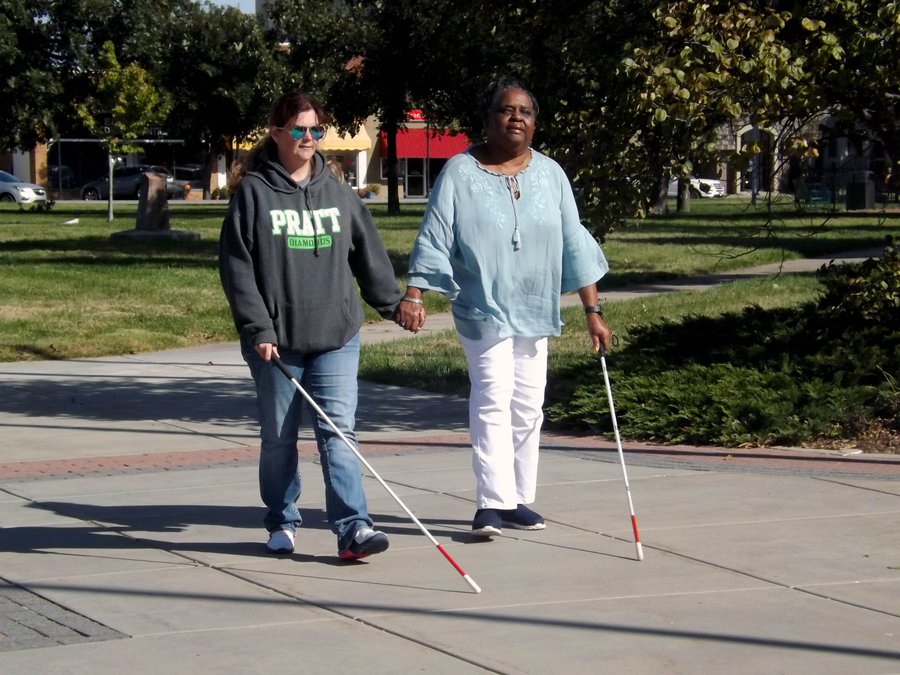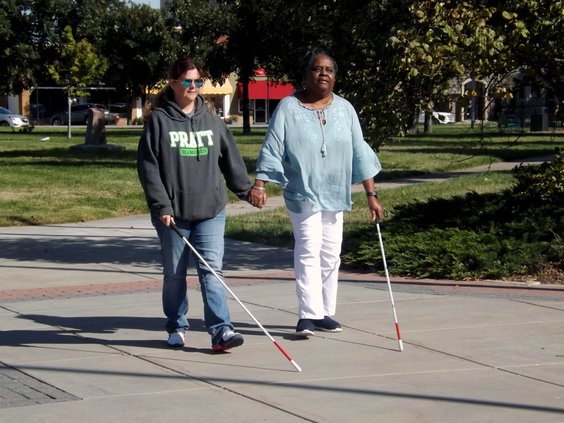John Stoskopf didn’t need his white cane to know he was approaching the corner of Broadway and Lakin; he could hear the music coming from Dawson Jewelers. The cane helped him navigate his way around obstacles on the sidewalk and to the curb cut at the crosswalk.
It’s not hard to see Stoskopf — most days he’s walking three dogs around his neighborhood and at other times the white cane extended in front of him is clearly visible to people without vision impairment. But somehow a motorist failed to see him one day last year as he was walking across Broadway Ave.
“The car sideswiped me,” Stoskopf recalled, thankful that his injuries were minor. “I was scraped up.”
As Stoskopf walked toward the band shell in the courthouse square Tuesday, he could hear the people he’d come to join that day. Most of them also carried white canes.
Oct. 15 is White Cane Safety Day, and members of the Central Kansas Association for the Visually Impaired observed the day with a walk around the Barton County Courthouse Square. The national observance celebrates the dignity and independence of individuals with vision impairment while it encourages others to be mindful and respectful. Motorists, in particular, are reminded that stopping for pedestrians crossing the street with white canes or guide dogs is not just a good idea. It is the law.
CKAVI members who walked Tuesday have varying degrees of sight. Stoskopf, 67, was born with vision impairment but could see enough as a child to learn the colors. Velma Jean Johnson had her first cornea transplant back in 1972. Scharna Doll became legally blind in 2017, when something went awry after her colon surgery.
Paul Berscheidt used to manage the Gibson store but wasn’t able to work once he couldn’t distinguish the numbers he was working with. Nowadays, he knows how annoying it can be to enter a retail store with low vision and discover that all of the products have been moved. It’s even more annoying to ask where something is and get a less than helpful answer such as, “try aisle 11.”
Technology and public awareness have changed a lot since 1964, when President Lyndon B. Johnson signed the resolution proclaiming Oct. 15 as White Cane Safety Day. Today, CKAVI members can avail themselves of tools such as scanners than will read aloud or crosswalks that provide audio cues. But the national observance is as important as ever.
People need to be aware of those who have different abilities. George Strobel, president of CKAVI, said Great Bend has done a lot of work making the streets easier to navigate for people who use wheelchairs but it could do more for those with vision impairments.
“Sidewalks (in Great Bend) are really ugly – some of them,” Strobel said. “And there are many places where there aren’t sidewalks.”
Johnson remembers when there were no curb cuts. But Strobel said many of those are set at a 45-degree angle to the street. “If you followed that ramp, you’d be right in the middle of the street.”
Berscheidt said the City might consider bringing someone to evaluate downtown’s accessibility. His group could probably recommend an Americans with Disabilities Act adviser who would be willing to provide some feedback, he suggested. “They spend all of this money for consultants in Great Bend; why not do a study of Great Bend’s business area?”
Doll’s vision is still good enough that she doesn’t always need a white cane to help her navigate. But she’s learning that the cane is also meant to be seen. It warns others to stop if they see a pedestrian crossing the street. To avoid bumping into someone as they hurry through a busy airport. To ask someone if they need help finding their way. (“Don’t grab; ask someone, ‘would you like help?’” she said.)
“It’s to tell you (the person with no vision impairment) I can’t see you,” Berscheidt said.
Learn more
CKAVI members were joined Tuesday by Tammy Fuhr from the Hutchinson office of Prairie Independent Living Resource Center Inc. PILR provides independent living services for persons age 55 or older who experience blindness or visual impairments. Her office is at 17 South Main in Hutchinson. Its toll-free telephone number is 888-715-6818.
The Robert J. Dole VA Medical Center Low Vision Clinic currently treats more than 300 veterans who are blind or visually impaired. Call 316-685-2221 extension 57110 for more information.
CKAVI is a support group that meets every fourth Monday of the month from 1-2 p.m. at the Great Bend Senior Center, 2005 Kansas Ave. For more information, contact Paul Berscheidt at 620-793-5645, George Strobel at 620-617-8980 or Scharna Doll at 620-786-0731.





